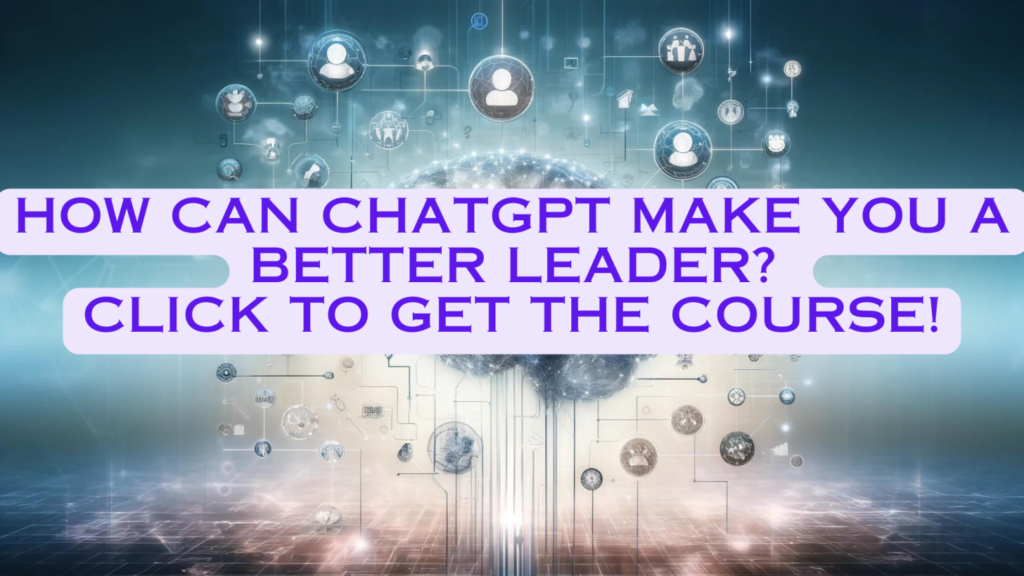Join 40,000 other subscribers who get Great Leadership delivered directly to their inbox each week. You’ll get access to my best thinking and latest content. Sign up today.
Lots of people have been signing up for new course, Leadership GPT: The Top 10 Ways You Can Use ChatGPT To Become A Better Leader which walks you through specific prompts, examples, and screen shares for how you can use ChatGPT in the day-to-ask aspects of your role. Today, I wanted to go over how leaders can use it for meeting preparation.
Efficient meeting preparation is crucial for driving productivity and maintaining focus. As artificial intelligence tools become more integrated into business processes, leaders have unique opportunities to enhance their meeting efficacy. One such tool is ChatGPT, which can significantly streamline the preparation process for meetings. Here’s how leaders can utilize ChatGPT to optimize meeting preparation, complete with a specific prompt that can be used to engage the AI.
Here are a few examples:
1. Generating Meeting Agendas
Leaders can start by using ChatGPT to generate detailed meeting agendas based on key objectives. For example, a leader can provide ChatGPT with a list of meeting goals and topics and ask it to organize these into a coherent agenda. Here’s a specific prompt a leader might use:
Prompt:
“ChatGPT, based on our goals to increase quarterly sales, improve customer service metrics, and reduce operational costs, please draft a detailed agenda for our upcoming strategic planning meeting, including time allocations for each topic.”
ChatGPT can then produce a structured agenda that allocates time effectively across topics, ensuring all objectives are addressed within the meeting’s time constraints.
2. Creating Pre-Meeting Briefs
To ensure all participants come prepared, leaders can use ChatGPT to generate pre-meeting briefs. This includes summaries of background information, previous meeting notes, and any new data that will be discussed.
Prompt:
“ChatGPT, summarize the last quarter’s sales data and include updates on customer service initiatives since our last meeting to create a pre-read document for the team.”
The resulting document can be shared with meeting participants ahead of time, allowing them to prepare adequately and engage more effectively during the meeting.
3. Crafting Questions for Discussion
A leader can also use ChatGPT to formulate critical questions that will foster discussion and provoke thought among meeting participants.
Prompt:
“ChatGPT, based on the agenda for our strategic planning meeting, can you generate a list of provocative questions to encourage deeper discussion on reducing operational costs?”
The questions generated can help drive meaningful conversations, ensuring that the meeting addresses the topics at depth.
4. Role-playing and Scenario Analysis
ChatGPT can assist leaders in preparing for potential objections or questions by role-playing scenarios that might occur during the meeting.
Prompt:
“ChatGPT, if I propose a 10% cut in operational costs, what are potential objections from the finance and human resources departments, and how could I address them effectively?”
By anticipating and preparing for these challenges, leaders can handle objections seamlessly during the meeting, leading to more productive outcomes.
ChatGPT can be an invaluable tool for leaders looking to enhance their meeting preparation. By automating agenda creation, producing pre-meeting briefs, formulating discussion questions, and preparing for potential objections, leaders can ensure that their meetings are not only well-organized but also highly productive.
As AI continues to evolve, its integration into business practices like meeting preparation represents a significant opportunity for leadership to enhance efficiency and drive better decision-making.
If you want to learn more then check out my new course, LeadershipGPT where I will walk you through how to use GPT in 10 specific areas listed below. You’ll get a certificate of completion, access to me via the course platform, and a downloadable PDF with prompts.
1. Enhance your communication skills
2. Professional development guidance
3. Meeting preparation
4. Feedback and performance reviews
5. Brainstorming sessions
6. Enhanced decision support
7. Learning new management techniques
8. Crisis management strategies
9. Culture and team building
10. Time management and productivity

